ZMA — short for zinc magnesium aspartate — is a supplement often taken by athletes and fitness enthusiasts to improve athletic performance, boost muscle growth and increase testosterone levels. ZMA supplements contain a blend of zinc monomethionine, magnesium aspartate and vitamin B6.
Each of these nutrients provide unique benefits in the body.
Best ZMA
1. Optimum Nutrition ZMA

Optimum nutrition’s ZMA supplement contains a healthy amount of zinc, magnesium, and vitamin B6. Though some supplements add extra ingredients in an attempt to boost bioavailability, Optimum Nutrition chooses to provide the vitamin and mineral content you need without any of the fillers.
150 mg of magnesium, 10 mg of zinc, and 3.5mg of vitamin B6 are presented in a gelatin capsule. Between the dosage and purity of this supplement, it’s no surprise that this is our #1 choice.
2. Evlution Z-Matrix
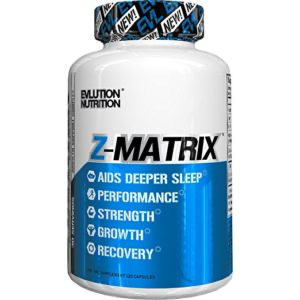
In addition to the standard ZMA ingredients you would come to expect, Evlution also includes vitamin D3, folic acid, L-theanine, BioPerine black pepper extract. These ingredients have been specifically identified as beneficial in the absorption process and will provide enhanced performance and results.
For those who would like a bit more flexibility in terms of when you take your ZMA supplement, this option is also free of melatonin making it useful during the day if you prefer.
3. Nugenix PM ZMA Testosterone Support
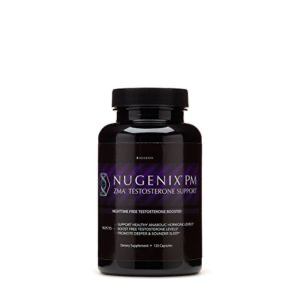
In addition to zinc and magnesium, Nugenix also includes Tribulus Terrestris and melatonin. The Tribulus Terrestris serves as a testosterone booster, which enhances the performance benefits naturally found in ZMA. The melatonin component acts as an effective sleep to aid in recovery after a gruelling workout.
Though many may not care for the additional ingredients in this supplement, it makes for a solid, reliable and effective choice for many users.
4. MP Essentials Z-Core PM
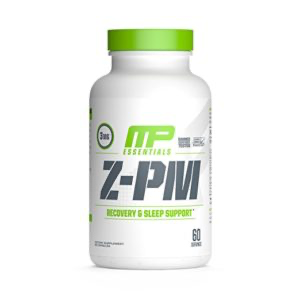
MusclePharm’s ZMA supplement places a high emphasis on supporting testosterone levels during sleep. It includes melatonin like many other ZMA supplements but also includes fenugreek extract and copper glycinate.
This combination not only helps you to go to sleep and stay asleep but also enhances testosterone production during the process.
5. JYM Supplement Science ZMA

While it does provide a standard mix of vitamin B6, magnesium, and zinc, JYM’s ZMA supplement also includes a proprietary extract derived from black pepper. Black pepper is a well-known absorption enhancer and serves to amplify the effects of the supplement.
This extra benefit combined with its vegetarian-friendly capsule makes it a quality product.
6. SNAC Nutrition ZMA-5

As the company that originally introduced the ZMA blend, it should come as no surprise that SNAC is still manufacturing one of the best ZMA products on the market. The SNAC Nutrition ZMA-5 formulation includes 5-HTP, which is a neurotransmitter known to increase absorption and mental function.
It also includes folic acid and BioPerine which also help to enhance the absorption qualities of their ZMA supplement.
7. ZMA Pro

Though ZMA Pro is a standard formulation of ZMA, it does have a slight difference in its quick release functionality.
This added benefit increases the rate at which you absorb included ingredients and enhances the effects on your performance. This is a great option if you take ZMA during the day rather than near bedtime.
8. Met-RX ZMA

Met-RX’s ZMA supplement doesn’t have some of the added vitamin or sleep ingredients found in other supplements, but it still represents an adequate of zinc, magnesium, and vitamin B6.
You’ll get 10.5mg of vitamin B6 450 mg of magnesium and 30 mg of zinc which is more than enough for all 3 elements.
9. Now Sports ZMA
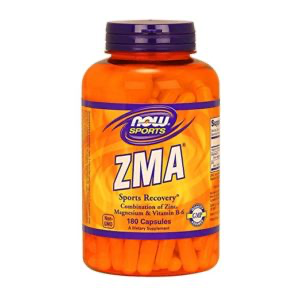
NOW Sports is a well-known supplement with a reputation for providing products that are usually quite effective and higher than normal quality. Their ZMA supplement excels in their delivery of vitamin B6 with 5mg per capsule and maintains what you would expect in terms of both magnesium and zinc.
While not innovative or ground-breaking, NOW Sports is still successful at providing a reliable ZMA product.
10. PrimaForce ZMA
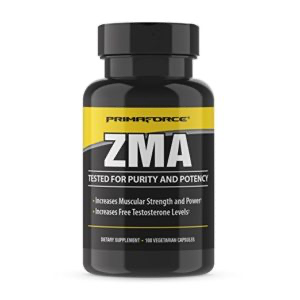
Produced in a GMP-compliant facility, PrimaForce’s ZMA supplement manages to provide a product that fits the requirements of ZMA while also giving you a bit more for your money.
How We Ranked
The first thing we looked at, when formulating our rankings, was the ingredients. In general, ZMA should include zinc, magnesium, and vitamin B6. If a supplement didn’t include all 3 of these specific elements, we removed them from consideration.
ZMA generally works best with melatonin or other ingredients to enhance absorption or testosterone production. As a result, ZMA products that included scientifically backed ingredients proven to compliment the effects of ZMA were, in some cases, preferred. This is a key reason Evlution Z-Matrixand Nugenix placed so high on the list. Their inclusion of folic acid, L-theanine, BioPerine black pepper, and vitamin D3 was found to be substantial and logical based on testing and previous results.
Lastly, we looked at the purity of each supplement. Though there are usually binders and stabilizers within ZMA supplements, we wanted to ensure the ingredients used for this were minimal and necessary. Products that contained extraneous ingredients, or too many stabilizers were heavily penalized and, as a result, did not make our final list.
Benefits
1. ZMA may enhance athletic performance. Of all of ZMA’s purported claims, its ability to build muscle and strength is the most predominant.
To assess the effects of ZMA on anabolic hormones and muscle function, researchers performed an eight-week study on 27 football players from Western Washington University. Nightly supplementation significantly increased muscle strength, functional power and testosterone and insulin-like growth factor (IGF-1) levels — a hormone that affects cell growth and recovery (1).
Testosterone is considered a potent anabolic agent that increases muscle mass and strength in humans. Similarly, IGF-1 has been identified as a critical mediator of muscle mass and strength (2).
It should be noted that one of the authors of the study has ownership in the company that produces the specific ZMA supplement tested. That same company also helped fund the study, so there may be a conflict of interest.
The results of another study, however, did not produce such promising results.
According to the Journal of the International Society of Sports Nutrition, ZMA supplementation in 42 resistance-trained males did not raise testosterone or IGF-1 levels. Furthermore, it did not improve body composition or exercise performance (bench press and leg press, upper- or lower-body muscular endurance, or cycling anaerobic capacity) 3.
2. ZMA may reduce exercise-induced fatigue. In a study of 10 sedentary men, supplementation of zinc for 4 weeks prevented exercise-induced fatigue (measured as a drop in thyroid hormone and testosterone levels) 4.
In a study of tae-kwon-do participants, magnesium supplementation prevented a drop in thyroid-stimulating hormone levels triggered by exhaustion during martial arts training (5).
3. ZMA may decrease the levels of the catabolic “stress” hormone, cortisol. Cortisol is a stress hormone released by the adrenal glands. High levels of cortisol can change the body from an anabolic (muscle building) to a catabolic (muscle losing) state.
In a double blind, randomized study of 23 triathletes, serum cortisol was lower in the magnesium-supplemented group before and after competition compared to controls. The authors concluded that the magnesium supplementation resulted in a reduced stress response without affecting competitive potential (6).
4. ZMA may improve sleep. Elderly patients are more likely to suffer from chronic insomnia characterized by difficulty maintaining sleep rather than difficulty falling asleep. (7).
In an Italian study, 43 elderly participants who took a daily combination of zinc, magnesium and melatonin — a hormone that regulates sleep-wake cycles — for 8 weeks, noted significant improvements in sleep quality.
Specific improvements included: ease of getting to sleep and quality of sleep and alertness the following morning, suggesting a beneficial effect on the restorative value of sleep (8).
A 2016 study found that in addition to helping prevent restlessness, irritability and lack of concentration, daily supplementation of 400 mg of magnesium can help treat sleep disorders (9).
Supplementing with zinc has also be linked to improving sleep quality in several other animal and human studies.
5. ZMA may boost immunity. Zinc and vitamin B6 both play key roles in immune health. Zinc, for example, is crucial for the development and function of immune cells. Several studies have shown the benefits of supplementation in reducing the number and duration of infectious diseases in humans, including chronic diarrhea and acute lower respiratory tract infections (10).
Vitamin B6 deficiency has also been linked to poor immunity. In fact, people with autoimmune disorders (rheumatoid arthritis, Crohn’s disease or inflammatory bowel disease) — which cause their immune system to mistakenly attack their own healthy tissues — sometimes have low vitamin B6 levels (11).
In an article published in The American Journal of Clinical Nutrition, researchers note that of the micronutrients studied, zinc, selenium, iron, copper, folic acid, and vitamins A, C, E and B-6 have important influences on immune responses (12).
Experts believe that the combination of ZMA may help boost the immune system.
6. ZMA may control blood sugar levels. Magnesium deficiency has been shown to directly influence the blood sugar control of type 2 diabetics.
According to the American Diabetes Association, magnesium supplementation improves insulin sensitivity — how sensitive the body is to the effects of insulin — and fasting glucose levels (13).
Zinc deficiency has also been suggested to be a contributing factor to the development of diabetes in some people. Zinc itself may be a crucial element in insulin metabolism, and type 1 diabetics are often zinc deficient; zinc supplements have been shown to lower blood sugar levels in some type 1 cases.
A 2012 comprehensive systematic review and meta-analysis on the effects of zinc supplementation in patients with diabetes demonstrated that zinc has beneficial effects on glycemic control and promotes healthy lipid parameters (14).
Furthermore, a meta-analysis of 18 studies, magnesium supplementation appears to improve glucose parameters in people with diabetes and also improves insulin-sensitivity parameters in those at high risk of developing diabetes (15).
7. ZMA may alleviate stress. Several studies have assessed the effects of a multivitamin/mineral product, containing mainly B vitamins (B1, B2, B3, B5, B6 and B12) plus vitamin C, calcium, magnesium and zinc on self-ratings of stress or psychological well-being.
In one study, groups taking a high dose vitamin B-complex (including 140 mg magnesium phosphate) for three months reported significantly lower personal strain and a reduction in confusion and depressed/dejected mood (16).
A 2018 randomized trial evaluating the effects of magnesium and vitamin B6 on stress, found that taking either a combination of magnesium/vitamin B6 or magnesium alone reduced stress from baseline to week eight by approximately 40 percent.
In people with severe or extremely severe stress (with low serum magnesium levels), taking magnesium and vitamin B6 in combination provided a 24 percent greater reduction in stress than magnesium alone (17).
Although these studies are promising, studies of longer duration are needed to determine whether the effects seen can be maintained beyond eight weeks.
8. ZMA may improve mood. The goal of a 2015 study was to explore the relationship of magnesium intake and depression in 8894 adults.
Researchers found that low magnesium intake was associated with depression in adults under 65, but seemed to be protective in seniors.
The surprising finding of the potential protective effect of low magnesium intake in older adults warrants further investigation (18).
Authors of a 2017 article, published in Topics in Clinical Nutrition, found that a review of studies illustrated the antidepressant effects of zinc and magnesium administration, as indicated by decreased anxiety and behavioral despair in rats and decreased anger and depression in humans (19).
Such findings highlight the importance of addressing the zinc and magnesium status of depressed patients and considering the use of supplementation as an adjunct to antidepressant therapy.
9. ZMA may treat ADHD. Attention-Deficit/Hyperactivity Disorder (ADHD) is a disorder that makes it difficult for a person to pay attention and control impulsive behaviors. Although there is limited evidence to support treating ADHD with mineral/vitamin supplements, research does exist showing that patients with ADHD may have reduced levels of vitamin D, zinc, ferritin and magnesium (20).
These nutrients have important roles in neurologic function, including involvement in neurotransmitter synthesis.
In study of children with ADHD, zinc (150 mg/day) was superior to placebo in reducing hyperactive, impulsive and impaired socialization symptoms, but it was not effective in reducing attention deficiency symptoms (21).
10. ZMA may help treat symptoms of premenstrual syndrome (PMS). In a study published in the Journal of Women’s Health, researchers investigated the effect of a daily supplement of 200 mg of magnesium for two menstrual cycles on the severity of PMS symptoms.
There was no effect of supplementation in the first month. However, in the second month, there was a greater reduction of weight gain, breast tenderness and abdominal bloating with supplementation compared with placebo (22).
According to Massachusetts General Hospital Center for Women’s Mental Health, limited evidence suggests that magnesium (200-360 mg a day) and Vitamin E (400 IU a day) can provide modest relief of symptoms. However, there is not yet enough research to recommend these as effective treatments for PMS 23.
Furthermore, the results of a meta-analysis, published in the Journal of Chemical and Pharmaceutical Science, revealed significant reductions observed in physical symptoms and psychological symptoms of PMS after supplementation of vitamin B6 (24).
Side Effects
ZMA appears to be safe when taken as recommended. However, side effects and health concerns have been reported when zinc, magnesium and vitamin B6 are taken in large doses or more frequently than recommended.
1. High doses of zinc and magnesium can cause gastrointestinal problems. Too much zinc and magnesium have been linked to nausea, vomiting, loss of appetite, stomach cramps and diarrhea.
2. Zinc can interact with a variety of medications. Taking zinc with certain antibiotics reduces the amount of both zinc and the antibiotic that the body absorbs. Zinc can also reduce the amount of penicillamine (a drug used to treat rheumatoid arthritis) that the body absorbs, making it less effective (25).
Taking too much zinc for a long time, may cause low copper levels, lower immunity and low levels of HDL cholesterol (the “good” cholesterol). 26
In addition, both zinc and magnesium can interact with diuretics (water pills) and blood pressure medicine.
3. Zinc may increase the risk of prostate cancer. A July 2003 paper published in the Journal of the National Cancer Institute reported that men who took more than 100 mg a day of zinc had more than double the risk of advanced prostate cancer compared to men who did not take zinc. Men who took any supplemental zinc for more than 10 years also had double the risk of prostate cancer (27).
4. High doses of vitamin B6 may cause nerve damage and pain or numbness in the hands or feet. According to the National Institutes of Health, taking high levels of vitamin B6 from supplements for a year or longer can cause severe nerve damage, leading people to lose control of their bodily movements. The symptoms usually stop when they stop taking the supplements.
Other symptoms of too much vitamin B6 include painful, unsightly skin patches, extreme sensitivity to sunlight, nausea and heartburn.
The tolerable upper limit of vitamin B6 is 100 mg per day for adults.
Recommended Dosage
Zinc, magnesium and vitamin B6 are found naturally in many foods and supplementation may not be necessary in those who eat a balanced diet.
When supplementation is recommended, it is available in several forms, including capsule or powdered.
Look for ZMA supplements that provide 30 mg of zinc, 450 mg of magnesium and 10-11 mg of vitamin B6. Most supplement labels advise men to take 3 capsules, and women to take 2 capsules.
Because of the inconclusive research on ZMA, supplementation is not recommended in individuals who already have optimized levels of zinc or magnesium or for those who are unaware of their levels of these minerals.
FAQ
What does ZMA supplement stand for? Zinc magnesium aspartate
What are ZMA supplements? They are a patented formulation, containing zinc monomethionine aspartate, magnesium asparate and vitamin B6 — all of which are vital for biological processes.
While all three are powerful on their own, it is believed that taking them in combination can enhance athletic performance and build muscle as well as provide other benefits. The science backing these claims, however, are mixed.
What is the best ZMA supplement? The best supplement contains the right ratio of zinc, magnesium and vitamin B6. Each serving should contain 30mg of zinc monomethionine aspartate, 450mg of magnesium asparate and 10-11mg of vitamin B6. Some manufacturers produce ZMA supplements with alternative forms of zinc and magnesium, or with other added vitamins or minerals.
Another important thing to look for is that the zinc and magnesium are in the aspartate form, not the chelate, sulfate or citrate form commonly found in multivitamins. Zinc and magnesium in their other forms, such as magnesium sulfate, are not absorbed as effectively by the body.
When should ZMA supplements be taken? Supplements should be taken on an empty stomach as zinc and magnesium are poorly absorbed when taken with food. Take them at least one hour after your last meal or snack or one hour before your next meal or snack. Take them 30-60 minutes before bedtime to help improve sleep quality, or use as directed by a physician or licensed nutritionist.
Where can ZMA supplements be bought? ZMA can be purchased online and in health food and supplement stores.
How much zinc, magnesium and vitamin B6 is in ZMA supplements? Each dose of ZMA supplements contains: 30 mg (zinc monomethionine), 450 mg (magnesium aspartate) and 10–11 mg (vitamin B6).
Does ZMA increase testosterone? So far, there is not a lot of research to back this claim. One study performed in 2000 on 27 NCAA football players, found a significant increase in players’ testosterone and IGF-1 levels — both of which are linked to enhancing muscle function and physical performance.
However, one of the scientists who conducted the study holds the registered trademark for the original formula of ZMA, and his company funded the research, which raises conflict of interest concerns.
Does ZMA cause side effects? When taken as directed, there are no harmful side effects. Research shows, however, that taking high doses of zinc, magnesium and vitamin B6, or taking them longer than recommended can cause adverse reactions.
High doses of zinc and magnesium may cause nausea, vomiting, loss of appetite, stomach cramps and diarrhea.
Taking too much zinc for a long time, may cause low copper levels, lower immunity and low levels of HDL cholesterol.
As with any supplement, speaking with a medical professional who is familiar with your health history is recommended before taking.
How much ZMA should be taken? ZMA supplements contain 30 mg of zinc, 450 mg of magnesium and 10-11 mg of B6. Manufacturer labels typically recommend men take 3 capsules daily and women take 2 capsules daily.
Is ZMA a steroid? No. It is a mineral support formula that limited research suggests may increase both anabolic hormone levels and muscle strength in trained athletes.
Is ZMA safe? ZMA is generally safe when taken at the recommended dosage. Problems arise when too much ZMA is taken, leading to such side effects as gastrointestinal complaints, low copper levels, lower immunity and low levels of HDL cholesterol.
Supplements can also interact with certain antibiotics, rheumatoid arthritis drugs and other medications.
High doses of vitamin B6 may cause nerve damage and pain or numbness in the hands or feet.
According to the results of one study published in 2003, men who took more than 100 mg a day of zinc had more than double the risk of advanced prostate cancer compared to men who did not take zinc. Men who took any supplemental zinc for more than 10 years also had double the risk of prostate cancer.
Women who are pregnant or breastfeeding, should speak with their healthcare provider before taking a ZMA supplement.
Does ZMA cause weird or vivid dreams? Many people report experiencing strange, vivid dreams when taking ZMA supplements. There have not been studies performed on this specific topic, so there are only theories as to why this may be occurring.
Magnesium’s ability to improve sleep quality may offer an explanation. Dreams occur during the rapid eye movement (REM) stage of sleep, and repeatedly getting a good night’s rest, a.k.a. quality REM sleep, is tied to improved memory functions.
Since magnesium has been linked to improved sleep, users not only experience prolonged dream time, they also have better recall of what they dreamed about.
Does ZMA interact with medications? Both zinc and magnesium can interact with a variety of medications, such as antibiotics, diuretics (water pills) and blood pressure medicine.
Zinc can also interact with penicillamine (a drug used to treat rheumatoid arthritis) by reducing the amount that the body absorbs, making it less effective.
Can I take ZMA with calcium? Yes, but take them separately. When taken at the same time, calcium blocks the absorption of zinc, interfering with its effectiveness. Maximize your benefits by spacing them out by at least two hours apart.
What foods contain zinc, magnesium and vitamin B6? Individuals who are not deficient in these minerals can maintain healthy levels the natural way by eating certain foods. Zinc can be found in oysters, red meat, poultry, crabs, beans, nuts and certain types of seafood (such as crab and lobster) contain zinc. Green leafy vegetables, such as spinach, legumes, nuts, seeds and whole grains, are good of magnesium.
The richest sources of vitamin B6 include fish, beef liver and other organ meats, potatoes and other starchy vegetables and non-citrus fruit.
Can you take too much ZMA? Yes, though not very common, there is a possibility of taking too many ZMA supplements. When taken in high doses, the individual components of ZMA can have sometimes unpleasant effects. Zinc, for example, may result in nausea, vomiting, or loss of appetite; Magnesium may cause similar symptoms as well as stomach cramps, and vitamin B6 may result in nerve damage. Before beginning ZMA supplementation it is recommended that you consult with your physician to determine the best dosage and regimen for your specific needs.
Is it safe for children to take ZMA? Though it is not generally considered to be unsafe, ZMA use in most children is not recommended. This is primarily due to the lack of scientific research and study to prove or disprove any provided benefits. If you are concerned about a child’s vitamin and nutrient levels, it is highly recommended that you seek guidance from your pediatrician before beginning supplementation.
What are the benefits for women who take ZMA? Though designed to boost testosterone, ZMA use in women can provide multiple benefits including sleep improvement. Additionally, women who take ZMA may also experience hormone regulation, cognitive function improvement, protection against, oxidative stress, improved immune function, and a reduction in fatigue. As with any supplement, it is important to take the correct dosage for your specific needs and consult with a physician before beginning supplementation.
Can ZMA assist with weight loss? Indirectly, ZMA could assist in the weight loss process. Presently, there is no research or data to suggest that ZMA directly provides weight loss benefits. It does, however, contain vitamins and nutrients that can increase metabolism and the performance enhancement qualities it provides may also help your workouts become more effective.
Can ZMA improve allergies? The answer to this question is currently unknown. Though ZMA has been proven to have positive effects on the human immune system, there have been very few indications that it can consequently reduce the occurrence of allergies. As allergies are a function of an overactive immune system in some cases, it could be worth exploring, however, it is recommended that you consult your physician before beginning ZMA supplementation for this specific purpose.
What are the individual ingredients in a ZMA supplement? ZMA’s individual nutrients, however, hold promise in providing such health benefits as improving blood sugar control, mood, immunity and sleep quality. Zinc is an essential mineral needed to help the immune system work properly and also plays a role in cell division, cell growth, wound healing and the breakdown of carbohydrates.
Magnesium aspartate is also an essential mineral that regulates diverse biochemical reactions in the body, including energy creation and muscle and nerve function. Vitamin B6 is a water-soluble vitamin that is significant to protein, fat and carbohydrate metabolism and the creation of red blood cells and neurotransmitters. Although manufacturers claim that taking ZMA supplements improve athletic performance and increase testosterone levels, the results of current scientific research are mixed.
Recap
ZMA is a compound supplement that contains zinc, magnesium and vitamin B6. It is promoted for its ability to improve athletic performance, body composition and increase testosterone levels, making it popular among athletes and fitness enthusiasts. Unfortunately, scientific evidence backing these claims are mixed. Research does show that consuming more zinc, magnesium and vitamin B6 may help boost immunity, alleviate stress, improve mood, control blood sugar levels and treat ADHD.
When taken as directed, ZMA appears to be safe. Consuming large doses and taking it longer than recommended can cause adverse reactions, such as gastrointestinal upset. Taking too much zinc for a long time, may cause low copper levels, lower immunity and low levels of HDL cholesterol, while high doses of vitamin B6 may cause nerve damage and pain or numbness in the hands or feet.
For Healthtrends #1 ZMA recommendation, click here.
